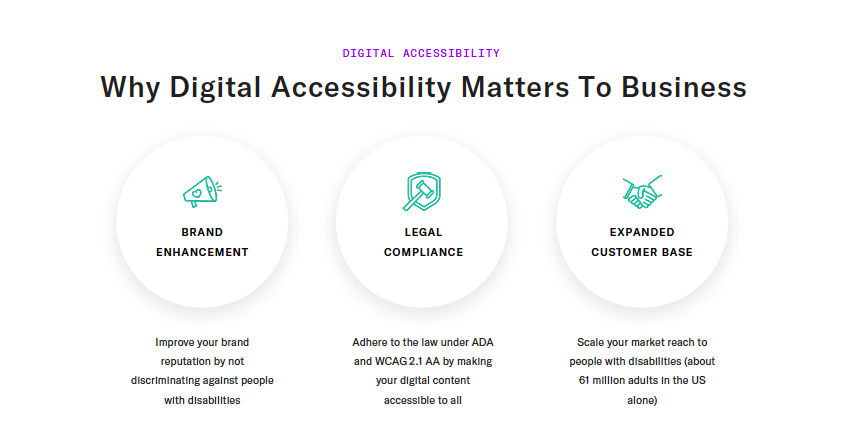Digital Accessibility Matters
26% of the United States population are adults living with some form of disability.
That’s 1 in 4 adults that may be experiencing a disability such as:
VISUAL – Blindness, Low vision, Color blindness
AUDITORY – Deafness, Hearing impairment
MOTOR – Difficulty in using hands, Limited fine motor controls, Muscle slowness, Tremors and spasms
COGNITIVE – Learning disabilities, Memory impairments, Attention disorders, Problem solving and logic
Not all website visitors have access to assistive tools such as screen readers – we can provide a solution for Web Enhancement Tools that allow site visitors to customize their user experience.
Brandit360 clients can receive a discount on this monthly service that we will install on your site and use to audit your site and stay in compliance. (clients on a monthly website maintenance plan will have this automatically included)
WCAG Website Compliance Standards
Website accessibility standards break down to four basic principles: Perceivable, Operable, Understandable, Robust.
Perceivable – Information and user interface components must be presentable to users in ways they can perceive.
This means that users must be able to perceive the information being presented (it can’t be invisible to all of their senses)
- Provide text alternatives for non-text content.
- Provide captions and other alternatives for multimedia.
- Create content that can be presented in different ways, including by assistive technologies, without losing meaning.
- Make it easier for users to see and hear content.
Operable – User interface components and navigation must be operable.
This means that users must be able to operate the interface (the interface cannot require interaction that a user cannot perform)
- Make all functionality available from a keyboard.
- Give users enough time to read and use content.
- Do not use content that causes seizures.
- Help users navigate and find content.
Understandable – Information and the operation of user interface must be understandable.
This means that users must be able to understand the information as well as the operation of the user interface (the content or operation cannot be beyond their understanding)
- Make text readable and understandable.
- Make content appear and operate in predictable ways.
- Help users avoid and correct mistakes.
Robust – Content must be robust enough that it can be interpreted reliably by a wide variety of user agents, including assistive technologies.
This means that users must be able to access the content as technologies advance (as technologies and user agents evolve, the content should remain accessible)
- Maximize compatibility with current and future user tools.
Staying compliant means providing accessibility tools to your website users and showing your commitment to digital inclusion.
Try out the tool by clicking on the accessibility icon on the bottom right of the page.
We want to make sure that 1. that websites are accessible to everyone and 2. your website does not create a liability for your business.


